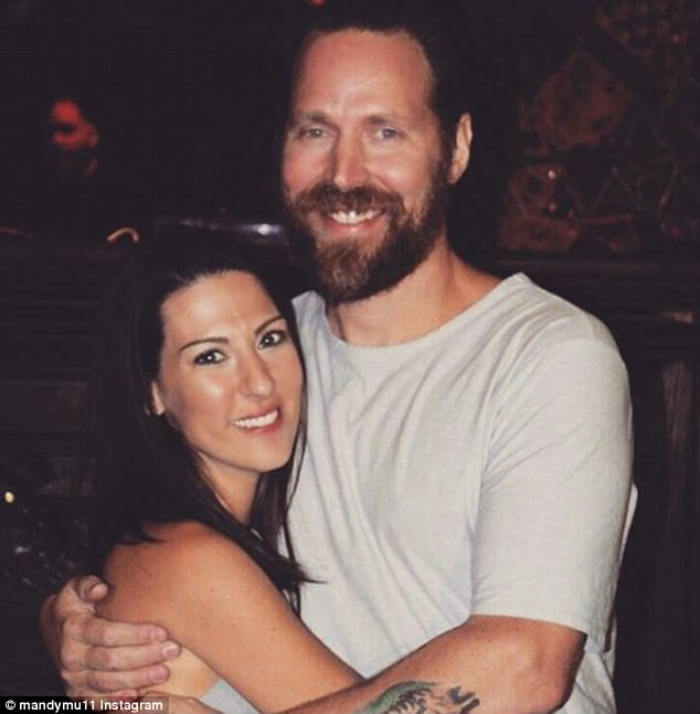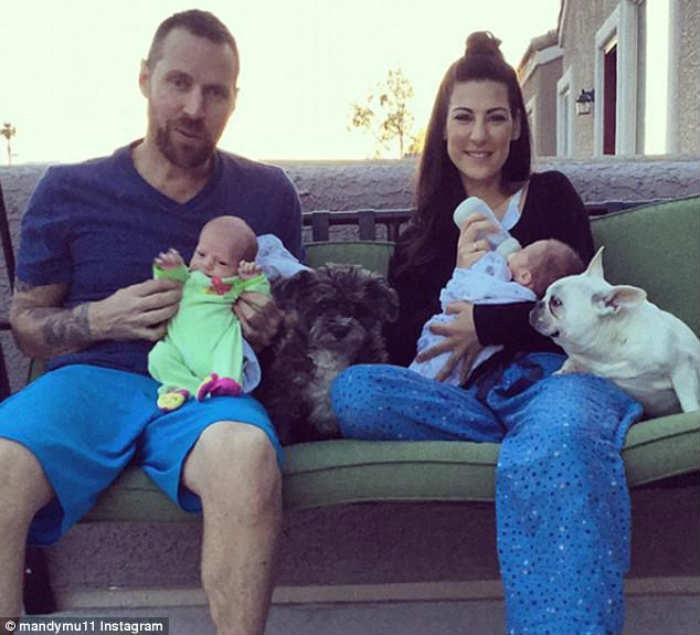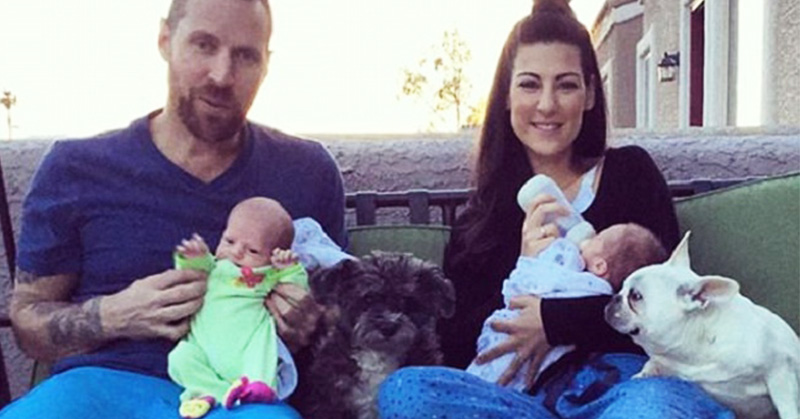This article was originally published on January 03, 2018, and has since been updated.
Imagine, for a moment, meeting the future love of your life at work. You begin dating, the sparks are flying, and you each know it’s meant to be. Now, imagine being in love with your beautiful partner, only to learn you have just weeks to live. How any given person chooses to respond to a reality like that can go any number of ways. Today, we’re sharing one of those ways…
How Robert Mooberry Approached His Battle with Cancer

Rob Mooberry was hospitalized with a perforated colon. But then the doctor dropped the C-word after scans revealed that Rob had stage 4 colorectal cancer, which had spread to his bowels, lymph nodes, and liver. He was shocked, and rightly so, especially since cancer was not part of his family history.
While Rob had no history of cancer in his family, it became a frightening and sobering reality overnight. Not just for him, either. After moving from Las Vegas to Los Angeles, Rob and his now-wife Amanda worked at the same bar, the Cosmopolitan, and had been together for nine months. But, if you want one person by your side during that time, it’s someone like her.
“[Amanda] came into the hospital, the doctor took her to one side and said basically that there was about an eight percent chance I would live… I couldn’t believe it. I was always a healthy person, I didn’t expect it.”
“She was so upset; my family was so upset. The doctors weren’t really telling me all of this but I knew it was serious, I thought I was going to die… But Amanda stuck with me. She could have left me, but she stayed. That’s when you know love is true.”[1]
While doctors believe his cancer may have been silently doing damage for two years, Rob Mooberry started experiencing symptoms about a year prior, including:
- Bloating
- Blood in his stool
- Change in bowel movements
- Stomach pains
- Losing 60 pounds in one year
When the searing abdominal pain became too much, with the assumption of it being irritable bowel syndrome (IBS) and no health insurance, he finally learned that nothing could pass by his colon because it was perforated.
“It was very painful. I went to the ER and that’s when I became an in-patient – they found it spread all around.”[1]
According to his doctors, Rob Mooberry did not have an easy road ahead either. In their outline for his treatment, he was looking at a colostomy bag, followed by an ileostomy, and radiation therapy on top of two bouts (at least) of chemotherapy.
As Rob and Amanda sat together in his hospital room trying to process their reality and how they were going to handle it, he had a revelation that time was of the essence and whispered in her ear, “I want to get married.” With only two weeks until his cancer treatment was scheduled to start, the couple tied the knot!
Trusting in his medical team, he decided to go through the necessary surgeries and first round of chemotherapy and radiation therapy. As a result, Rob’s cancer downgraded to stage 3A. However, through his own intuition, he knew his body could only handle so many chemicals. So, he chose to pursue a more alternative treatment.
Instead of following through with the remaining chemotherapy and radiation treatments, Rob Mooberry changed something – his diet.
From the moment of his diagnosis, Rob started eating a plant-based diet saying, “I just wanted to be as healthy as possible.”[1] It wasn’t hard either, seeing as Amanda has always been vegetarian.
“At first, I wasn’t all raw vegan, it was just vegetarian,” he explained. “To be honest, it was easier for us to just cook one meal rather than two, so being plant-based was straightforward.”[1]
Oncologists urged him to continue with the cancer treatments as soon as possible, but Rob couldn’t find it in him to go that route.
“It was horrible. I had to take time off work, I had no energy, I felt sick. That kind of medicine puts so many chemicals in your body… I needed to heal. That’s when I knew I needed to do anything to beat this cancer. I was really willing to try anything to save my life. That’s when I went hardcore raw, vegan, superfoods.”[1]
So, without thousands of dollars to spend on colon cancer specialists in Tijuana, Mexico, and other expensive alternative therapies, Rob Mooberry continued eating a vegan diet that also cut out all sugars from his diet, including red meat and dairy.
About half a year later, in early 2013, Rob went for a follow up CT scan to find that his cancer had downgraded by 80 percent. By 2014, according to Daily Mail, there was absolutely no trace of his cancer.
Now, Rob Mooberry is celebrating 5 years of cancer-free living with his wife Amanda and their two 20-month-old twins. He even runs a small non-profit cancer charity, Mu Casa Moo Foundation, alongside his bartending job “that raises money for individuals and families struggling financially during and after battling cancer.”[1,2]
“It’s crazy to think that a few years ago we had all the odds stacked against us,” Amanda said. “But it just goes to show you that love can create miracles.”

The Food and Cancer Connection You May Not Want to Ignore
Rob Mooberry doesn’t consider himself a vegan advocate; in fact, it slightly overwhelms him:
“I’m not standing on a soapbox saying everyone needs to go plant-based and vegan. But if you’re going to ask me what worked for me, I’ll tell you: this diet.”[1]
Ultimately, a decision like that comes down to your personal beliefs, knowledge of your body, and the research you do. Although we can say that Rob’s dietary changes were 100% responsible for his being cancer-free now. But, there does seem to be a clear connection between how and what people eat, and their cancer risk.
Researchers estimate that people’s cancer risk from uncontrollable factors is surprisingly less than 30 percent. The other ~70 percent is actually in your control, if you choose.[3]
While scientists have conducted smaller studies in hopes of learning what foods lower or raise our risk of cancer, larger studies are needed – and some are underway. The EPIC study (European Prospective Investigation into Cancer and Nutrition), for example, is doing that exactly. As one of the largest and longest cohort studies (at 15 years), researchers are observing 521,000,000 participants across ten European countries.[4,5]
Here’s what we do know about certain foods that have been linked to cancer…
- Foods preserved in salt (e.g., pickled vegetables, salted fish, and cured meat) could increase the risk of stomach cancer. This can happen as a result of salt damaging the stomach lining, which can cause inflammation and make it more sensitive to cancer-causing chemicals. causes inflammation, or by making the stomach lining more sensitive to cancer-causing chemicals.[4,6]
- Red meats, especially when charred, form HCAs and PAHs when cooked at high temperatures. Extended periods of exposure to these can cause cancer in animals and even humans.[6,7]
- Sugar can greatly increase cancer risk and has been affirmed in an October 2017 study published in Nature Communications. During this nine-year study, scientists found that sugar promoted the growth of malignant tumors.[8]
Indeed, there’s much more work that needs to be done, but that isn’t reason enough to consider yourself safe. It’s becoming quite clear your dietary habits can promote cancer or protect against is, so choose your foods wisely.
Disclaimer: Please consult a physician before beginning any treatment program or making any adjustment to your health care, diet, and/or lifestyle. Do not remove yourself from any prescribed medications or treatments without consulting your doctor. Any and all dietary supplements or nutritional products and treatments discussed on this site are not intended to diagnose, treat, prevent, or cure any disease. The information contained in this site is for general information and for educational purposes only.
Sources
- [1] Mia De Graaf Health Editor For Dailymail.com. (2017, December 16). Father-of-two claims his cancer went into remission after going vegan and foregoing further treatment. Retrieved January 02, 2018, from https://www.dailymail.co.uk/health/article-5181059/Father-two-CURED-cancer-going-vegan.html
- [2] Mu Casa Moo Foundation. (n.d.). Retrieved January 02, 2018, from https://mucasamoofoundation.org/
- [3] Publishing, H. H. (n.d.). Cancer and diet: What’s the connection? Retrieved January 02, 2018, from https://www.health.harvard.edu/cancer/cancer-and-diet-whats-the-connection
- [4] How healthy eating prevents cancer. (2017, April 07). Retrieved January 02, 2018, from https://www.cancerresearchuk.org/about-cancer/causes-of-cancer/diet-and-cancer/how-healthy-eating-prevents-cancer
- [5] European Prospective Investigation into Cancer and Nutrition (EPIC). (n.d.). Retrieved January 02, 2018, from https://epic.iarc.fr/
- [6] Diet. (n.d.). Retrieved January 02, 2018, from https://www.cancer.gov/about-cancer/causes-prevention/risk/diet
- [7] Zheng, W., & Lee, S. (2009). Well-done Meat Intake, Heterocyclic Amine Exposure, and Cancer Risk. Retrieved January 02, 2018, from https://www.ncbi.nlm.nih.gov/pmc/articles/PMC2769029/
- [8] Peeters, K., Leemputte, F. V., Fischer, B., Bonini, B. M., Quezada, H., Tsytlonok, M., . . . Thevelein, J. M. (2017). Fructose-1,6-bisphosphate couples glycolytic flux to activation of Ras. Nature Communications, 8(1). doi:10.1038/s41467-017-01019-z

